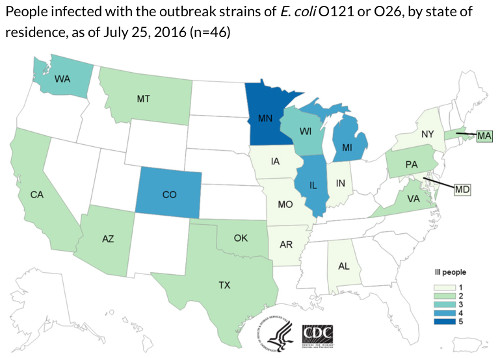General Mills, Inc., is an American multinational manufacturer and marketer of branded consumer foods sold through retail stores. It is often referred to as Big G. It has headquarters in Golden Valley, Minnesota. It sells many of the popular brands like Gold Medal flour, Annie’s Homegrown, Betty Crocker, Yoplait, Colombo, Totino’s, Pillsbury, Old El Paso, Häagen-Dazs, Cheerios, Trix, Cocoa Puffs, and Lucky Charms. It has more than 89+ brands in its portfolio. Its history starts as early as 1866. Let us look at how the company handled Flour recall in 2016.
In mid-2016, health officials traced 38 cases where E.Coli was present in contaminated flours and many of these flours were from General Mills. U.S. Food and Drug Administration (FDA) investigated the issue of the outbreak of Shiga toxin-producing Escherichia coli (STEC) infections. A total of 63 cases were identified from over 24 states and 17 people needed hospitalization.

The pieces of evidence were traced and it leads to General Mills facility in Kansas City, Missouri, which was likely source of this outbreak. It was found that almost 50% of the cases ate or tasted raw dough or flour.
The response of General Mills:
General Mills quickly responded via press release and social media posts and gave out all piece of information available. They also provided all necessary contact details where people could contact the company officials.
Lesson: Always be ready with a situation where you have to face a similar situation. Keep a plan ready and handy to implement. Know who will speak to Media, what kind of posts will go on social media platforms. Keep press release templates for different situation and respond quickly, when such a situation arises.
Even when it wasn’t proved that General Mills flours were involved in this outbreak, the company quickly recalled 10m pound of all its flour brands. It did so before any public announcements were made by health officials. This portrayed that General Mills truly cares about the consumers.
- July 9, Krusteaz brand pancake mix;
- July 11, Betty Crocker cake Mix;
- July 12, Golden Dipt breading mix; and
- July 13, Marie Callender’s cheese biscuit mix.
When it was found that more than 50% of the cases recalled eating or tasting raw dough; the company took this as an opportunity to educate consumers. This was a way to demonstrate its commitment.
Lesson: Be honest with the public and put their interests above. Value their health and safety with utmost priority. Also, find ways to demonstrate your commitment. Learn to turn crisis into opportunity.
Read about other product recalls:
Johnson & Johnson’s Tylenol Recall
[wpforms id=”320″ title=”true”]

